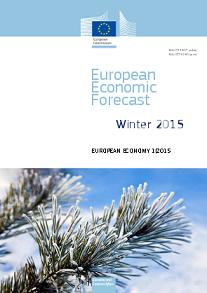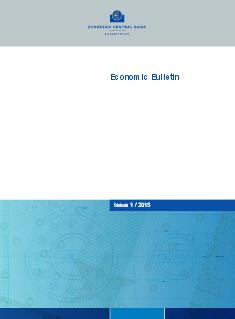European Commission (2015) European Economic Forecast: Winter 2015, European Economy 1|2015, DG for Economic & Financial Affairs, Φεβρουάριος. GDP growth in the EU remains sluggish. Sputtering investment has so far prevented a broader and more robust acceleration of domestic demand. Amid challenging global conditions, the fall in crude oil prices should provide a welcome boost to growth. Several important shifts are under way in the global economy. Falling oil …Read More
Update on Economic and Monetary Developments, Economic Bulletin Issue 1/2015
ECB (2015) Update on Economic and Monetary Developments, Economic Bulletin Issue 1/2015, European Central Bank, Φεβρουάριος. Summary The recent decline in oil prices is supporting the global economic recovery. Nevertheless, the recovery remains gradual and economic developments vary across regions. Growth in the United States remains robust, momentum is slowing in China, and activity in Japan has not regained traction. Economic conditions in Russia have deteriorated further, but spillovers …Read More
Why did Britain join the EU? A new insight from economic history
Campos, F. N. & Coricelli, F. (2015) “Why did Britain join the EU? A new insight from economic history“, VoxEU Organisation, 03 Φεβρουαρίου. Britain eschewed EU membership in the late 1950s but changed its mind in the early 1960s, only to be rebuffed by Charles de Gaulle. Membership came only in the early 1970s. This column argues that, among others, Britain joined the EU as a way to avoid …Read More
We already have a simple and conventional story to explain the weak recovery
Wren-Lewis, S. (2015) “We already have a simple and conventional story to explain the weak recovery“, VoxEU Organisation, 30 Ιανουαρίου. The anaemic recovery from the Global Crisis and the downward trend in real interest rates since 1980 have revived interest in the idea of secular stagnation. This column argues that if the US, UK, and Eurozone had not pursued contractionary fiscal policies from 2010 onwards, the recovery would not …Read More
Secular stagnation in the Eurozone
De Grauwe, P. (2015) “Secular stagnation in the Eurozone“, VoxEU Organisation, 30 Ιανουαρίου. Nowhere in the developed world is the secular stagnation more visible than in the Eurozone. This column explains this phenomenon with asymmetric external balances within the Eurozone. Southern counties had accumulated current-account deficits and became debtors when the Crisis hit, whereas the northern ones became creditors. The burden of the adjustments has been borne almost exclusively …Read More
Who’s (still) exposed to Greece? – a first trace of normalisation and resume in confidence since 2013, which the present political turmoil risks to revert
Merler, S. (2015) “Who’s (still) exposed to Greece? – a first trace of normalisation and resume in confidence since 2013, which the present political turmoil risks to revert“, Bruegel Institute, 29 Ιανουαρίου. Since the start of the crisis, the structure of Greek debt has changed considerably (almost 80 percent of government financial liabilities are now accounted for by loans, against slightly less than 20 percent back in 2008). At the same …Read More
Η τελευταία και καλύτερη ελπίδα της Ευρώπης
Neil, Irwin, (2015), “Η τελευταία και καλύτερη ελπίδα της Ευρώπης”, Η Καθημερινή, 23 Ιανουαρίου. Το πρόγραμμα που ανακοίνωσε χθες ο Μάριο Ντράγκι και αποτελεί προσπάθεια να ανασυρθεί η ευρωπαϊκή οικονομία από την ύφεση έρχεται με καθυστέρηση μηνών, είναι μικρό σε σύγκριση με τα αντίστοιχα σε ΗΠΑ και Ιαπωνία, και περίπλοκο για να ικανοποιήσει πολιτικές σκοπιμότητες. Ισως, όμως, είναι η τελευταία και καλύτερη ελπίδα της Ευρώπης να μη διολισθήσει σε μία …Read More
Grexit 2015: A primer
Gros, Daniel, (2015), “Grexit 2015: A primer”, CEPS Commentaries, 23 Ιανουαρίου. In the run-up to the Greek elections on January 25th and the subsequent renegotiation of the country’s economic adjustment programme with the troika, Daniel Gros writes in this Commentary that “nobody officially wants Grexit”: not Syriza, which wants Greece to stay in the euro. It is ‘only’ asking for a reduction in Greece’s official debt and an end to …Read More
The ECB has fired its bazooka
Wolff, Guntram, Merler, Silvia, (2015), “The ECB has fired its bazooka” , Bruegel, 23 Ιανουαρίου. The ECB announced today an expansion of its asset purchases, to include securities issued by European agencies and institutions, as well as central government in the euro area. Purchases are intended to be continued until at least September 2016 and in any case until the Governing Council sees a sustained adjustment in the path of …Read More
The ECB’s New Macroeconomic Realism
Jeffrey D. Sachs, (2015), “The ECB’s New Macroeconomic Realism”, Project Syndicate, 23 Ιανουαρίου. The European Central Bank has finally launched a policy of quantitative easing (QE). The key question at this stage is whether Germany will give the ECB the freedom of maneuver needed to carry out this monetary expansion with sufficient boldness. Though QE cannot produce long-term growth, it can do much to end the ongoing recession that has …Read More







